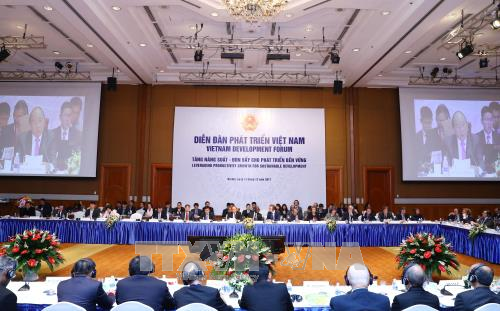(VOVWORLD) - The Vietnam Development Forum, was held on Tuesday in Hanoi, where the Vietnamese government officials and their partners discussed ways to increase productivity to aid Vietnam’s sustainable growth.
 The Vietnam Development Forum opens held in Hanoi on December 11 (Photo: Thong Nhat/TTXVN) The Vietnam Development Forum opens held in Hanoi on December 11 (Photo: Thong Nhat/TTXVN) |
Amidst the numerous challenges of being a middle-income country since 2010 and the 4th industrial revolution, Vietnam considers increasing productivity a key to sustainable growth.
Increasing productivity, a core issue in Vietnam’s economy
Productivity is the main index of the labor market, reflecting sustainable economic growth, competitiveness and labor use efficiency in each country. Vietnam’s productivity has increased 5.3% since 2015. The figure is expected to rise sharply this year. But this growth lags behind other countries in the region.
Simon Matthews, Director of the ManPower Group in Vietnam, Thailand, and the Middle East, told VOV: “You have a very large workforce. I think that’s a big positive sign. I think hard working, ethical dedicated are very great attributes the Vietnamese people in the workforce have. I think they need to channel that into skill development, it’s not just in Vietnam but in other Asian countries and around the world.”
Forum participants agreed that increasing productivity will be the key to Vietnam’s economic development but it will also be a challenge. Minister of Planning and Investment Nguyen Chi Dung said: “The Vietnamese government has put in place several solutions to promote innovation and the application of science and technology in production in order to increase productivity, efficiency, and competitiveness of the economy. In its socio-economic 2018 plan, the government aims to increase productivity, efficiency, and competitiveness and promote innovative startups.”
Core issues to be addressed
World Bank Country Director in Vietnam Ousmane Dione says Vietnam should improve energy efficiency in industrial production, accelerate agricultural restructuring, promote farming businesses, and strengthen its transport and logistics systems. He said effective collaboration between domestic and foreign firms is important to improving Vietnam’s position in the global value chain which will help increase Vietnam’s output. Mr. Dione said: “We cannot emphasize more than importance of education, skills, and innovation agenda in the country’s quest for productivity growth. Vietnam has done well in the budget education but new sets of knowledge and skills are needed to contribute to productivity growth and importantly to exchange the economy. They skills set are sought by Vietnamese and foreign employers will change requiring the labor market and higher education establishments to adapt, especially workers with advanced skills and education are in source supply.”
Dione said Vietnam should continue improving its business climate, simplifying administrative procedures and properly allocating land and capital resources.